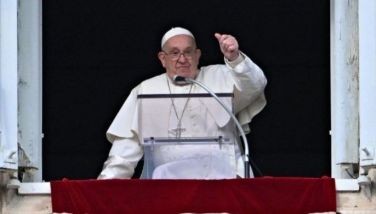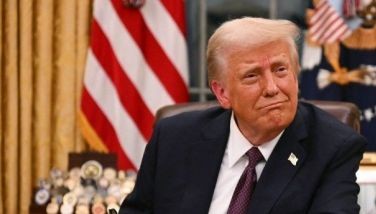Venezuela crackdown stuns once-welcomed Colombian migrants
CARACAS, Venezuela — Leidy Echeverri fled the Colombian countryside six years ago with her toddler in tow after a paramilitary group threatened her husband's life. Now she's again taken her children and run, this time in the other direction, amid a Venezuelan crackdown on Colombian immigrants.
The 28-year-old is one of an estimated 6,000 Colombian immigrants who have scrambled back across the border this week as embattled President Nicolas Maduro blames his neighbor for problems at home, ranging from rampant crime to widespread shortages.
"Maduro was supposed to be our brother, and he's thrown us out like garbage," Echeverri said from one of five overcrowded emergency shelters set up along the border in Colombia to receive the exodus.
The socialist president declared a state of emergency in six western cities bordering Colombia and suspended some constitutional rights. He said the move was needed to combat a thriving contraband trade after gang members shot three soldiers.
Residents of Echeverri's shantytown were given 72 hours to leave, prompting a frenzied decampment, with immigrants carrying refrigerators, water tanks, and even doors and windows across a muddy knee-deep river dividing the two countries.
Images of the crossing and reports of soldiers abusing deportees have spooked many of the 5 million Colombians who make up 15 percent of Venezuela's population.
Colombia's consulate in Caracas added extra staff to deal with an hours-long line that snaked around metal dividers on the sidewalk as immigrants rushed to get their papers in order.
More than 100,000 Colombians migrated to Venezuela in 2014, Maduro said this month, slightly down from the year before.
His country has deported 1,000 Colombians in the past week, and 5,000 more have left of their own accord, according to Colombian President Juan Manuel Santos. Santos recalled the Venezuelan ambassador to Bogota late Thursday for consultations, which is the diplomatic equivalent of lodging a complaint.
Life has gotten harder for many Venezuelans as shortages have spread and triple-digit inflation has undermined workers' earnings. Still, many immigrants believe they are better off staying in the country where they have built lives and where the cost of living remains dramatically lower than in Colombia, thanks to government subsidies and price controls.
Despite a buoyant economy that's forecast to grow 3.5 percent this year — compared to a 7 percent contraction for Venezuela — Colombia remains the most unequal country in South America, with an income distribution comparable to much-poorer countries like Haiti and Angola, according to the World Bank.
Colombians have been moving across the border en masse since the 1970s, fleeing a decades-long civil war and drawn by Venezuela's once-booming oil economy and tradition of welcoming immigrants.
Maduro's mentor, the late Hugo Chavez courted these immigrants, granting them residency and access to social programs that don't exist in Colombia, including free housing and health care.
In 2004, Chavez gave Colombian immigrants residency and even the right to vote, saying the two countries were brothers, both part of a single nation briefly created by his hero, Simon Bolivar, after liberation from Spain.
His administration boasted that it was saving poor Colombians all but driven across the border by right-wing president Alvaro Uribe, who often squabbled with Chavez.
Maduro, who is dogged by untrue rumors that he was born in Bogota, initially continued those policies after winning election in 2013. For example, a quarter of the 700,000 homes the state has given away in recent years have gone to Colombian citizens, according to Venezuelan ombudsmen Tarek William Saab.
But lately, immigrants say they have started to feel a chill from the people whose hair they cut, children they watch, and homes they build.
Some say they have been unable to buy subsidized food in state-run supermarkets that require shoppers to show identification. Others say they have been evicted from squatter communities and denied the substitute housing given to full Venezuelan citizens. Deportations have been on the rise for months.
Perhaps the biggest blow was Maduro's decision last year to suspend remittances on which communities back in Colombia depend. He argued that the move, which suddenly cut off some $500 million a year, was needed to prevent enemies from emptying Venezuela's foreign reserves in an "economic war."
Last week, he said Venezuela was suffering because of the "poverty and misery" bleeding over from its neighbor.
"Who comes from Colombia? People practically without education, without a penny in their pocket," he said.
Words like those hurt Osneido Alvarez, a hairdresser who moved to a town near Caracas 13 years ago seeking adventure and economic opportunities, and stayed because she married a Venezuelan.
"I felt so welcome when I came here, and now I feel so rejected," she said.
- Latest
- Trending




























